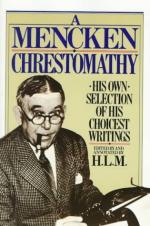|
This section contains 400 words (approx. 1 page at 400 words per page) |

|
Chapter 27, Music, Chapter 28, The Lesser Arts Summary and Analysis
In Chapter 27, Mencken proceeds to analyze various musicians and types of music. He opens with an expression of admiration for Beethoven, for his stature only grows continually. The nineteenth century had many great musicians and composers, but Beethoven was best. Schubert, Mencken notes, was lucky enough to avoid too much popularity; he simply could not write for the mob and failed when he tried. He praises Brahms' Sextet for Strings, Opus 18 to the skies.
Mencken regards Wagner's achievements as stupendous, particularly given his two shrill wives; he denies that Parsifal is meant to praise Christianity, despite Nietzsche's protestations. He argues that Johann Strauss's centenary went by unnoticed in America because a Viennese Waltz is essentially a joyous and merry phenomenon, which was effectively banned when alcohol was banned in the United...
(read more from the Chapter 27, Music, Chapter 28, The Lesser Arts Summary)
|
This section contains 400 words (approx. 1 page at 400 words per page) |

|




